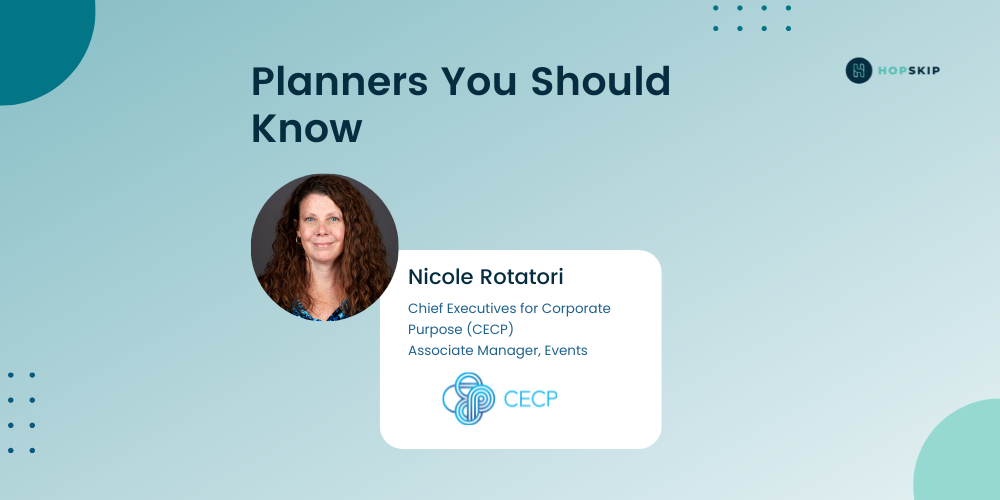This post is part of the HopSkip Planner Spotlight Series where HopSkip spotlights planners across the industry to bring awareness of how they adapted to COVID-19, communicating and lessons learned and sharing how they are viewing the meetings and events industry in a post-pandemic world.
Name: Nicole Rotatori
Company Name: Chief Executives for Corporate Purpose
Job Title: Associate Manager, Events
Years of Experience: 16
How did you get your start in the events industry? What made you pursue this role?
I started working in a community relations/public relations role for a retailor, where part of my job was planning charity and community events along with grand openings.
How do you compare planning your first in-person event post-pandemic, to planning meetings/events pre- Covid? What was different and unique? What was similar?
Planning our first in-person summit post-pandemic was challenging. We always had to have a plan B in place should Covid numbers go up and the city, state or country goes back into lockdown or limits large gatherings. Although we were primarily holding the event as an in-person event, we also wanted to provide virtual options for those that weren't ready to be in-person or weren't able to attend due to their company's current travel policies. We purposely booked a venue that had in-house live-streaming capabilities and could also switch us over to a 100% virtual event if needed. The structure of the event was very similar to our past summits, with mainstage presentations, breakout sessions, shared meals and plenty of networking time but just with added safety measures in place. Our attendee's comfort and safety were a top priority in our planning. We kept our max attendee number down (150 vs 250 pre-Covid) to allow for social distancing, provided masks for those that wanted them, hand sanitizing stations and even buttons for our attendees to wear that let others know their comfort level of shaking hands or hugging.
What was your number one challenge in hosting your first in-person event(s) and how did you overcome it?
Our biggest challenge was the not knowing if Covid numbers would rise again and therefore stop us from having an in-person event. For a large event like our Summit, we begin planning 9 months before the event. In August of 2021, we hoped that everything would be okay in May of 2022 but we always had to have that plan B, and even a plan C in place. Since we wanted to offer some virtual options, like live streaming our mainstage presentations for those that weren't comfortable or couldn't attend in person, we secured a venue that had in-house AV services that could live stream, assist with speakers who were virtual and switch our event to 100% virtual if we needed.
What is the top learning that you uncovered from the last two years that you’re implementing in your planning process today? (any other tips or tricks you want to share?)
My top learning is that we as event managers have to be prepared for anything and adaptable. I feel as professionals we are now better prepared to handle any issues or situations that arise. In this new landscape, we will constantly have to evaluate and re-evaluate the formats and types of events we host to make sure we are keeping our audiences engaged. With in-person, hybrid and virtual options, it allows for more opportunities and creative solutions in building events.
With hotels short-staffed, and RFP lead time shortening, what is your advice to other planners to overcome these obstacles when requesting hotels for proposals?
Be prepared, flexible and patient. Have your needs clearly thought through and outlined before that initial outreach. Know that due to staffing issues, you may need to send out your RFPs to more venues than you had in the past. Don't be afraid to pick up the phone and make a call to follow up - everyone's email box is completely overwhelmed so sometimes a quick call will get you a response faster and save that person the time in responding back to your email.
Are you approaching contracting with hotels differently, post-pandemic?
Yes, I'm asking for more flexibility with proposals and subsequently contracts especially with hoteliers and other venues in regard to cancellations and rescheduling. I feel I'm also having very open and transparent dialogues from the beginning to ensure all expectations are met for both parties.
What is the biggest area of improvement that you think hotels can make when either responding to your RFPs or during the contract phase of your event?
Being more flexible with cancellation policies.
Due to the pandemic, our events community had to evolve, adapt, and grow. Many planners started to embrace new technologies as a result of the pandemic. What new tech are you using today in your planning process as a result?
I’m definitely utilizing more technologies in general. I'm constantly looking at webinar platforms to make sure I'm up to date on functionality, as well as event management platforms that give me hybrid options, and those that offer more engagement opportunities to make it inclusive whether you are in person or virtual. I’m looking more closely at venues that can offer capabilities to host the event in person but also offer live streaming, recording and studio services in-house.
Since education and relationships are two major pillars in the meetings and events industry, any suggestions on how other planners can learn and network with their peers across the industry?
I like using LinkedIn groups to network and learn from my peers in the industry. I'm also looking forward to getting back to more in-person conferences and events geared towards event planners to make those connections.
This post is part of the HopSkip Planner Spotlight Series where HopSkip spotlights planners across the industry to bring awareness of how they adapted to COVID-19, communicating and lessons learned and sharing how they are viewing the meetings and events industry in a post-pandemic world.
